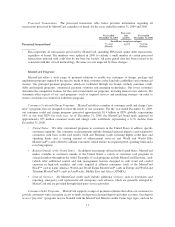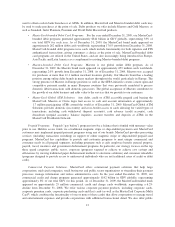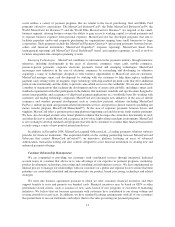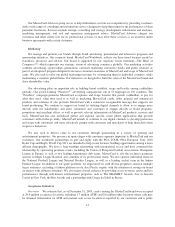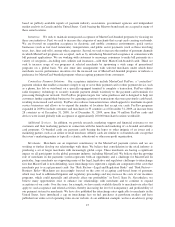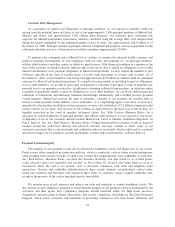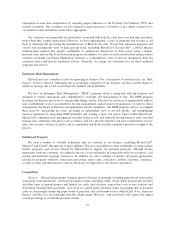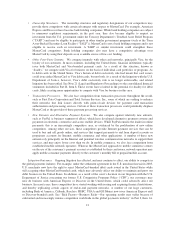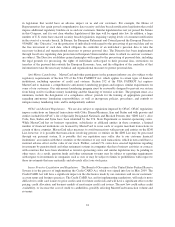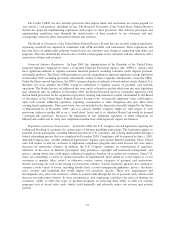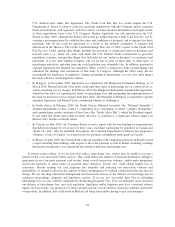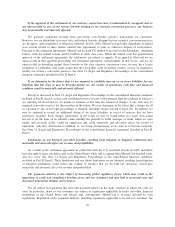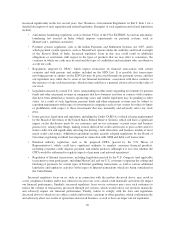MasterCard 2009 Annual Report Download - page 31
Download and view the complete annual report
Please find page 31 of the 2009 MasterCard annual report below. You can navigate through the pages in the report by either clicking on the pages listed below, or by using the keyword search tool below to find specific information within the annual report.•Ownership Structures. The ownership structures and regulatory designations of our competitors may
provide those competitors with certain advantages with respect to MasterCard. For example, American
Express and Discover have become bank holding companies. While bank holding companies are subject
to numerous regulatory requirements, in the past year, they also became eligible to request an
investment from the U.S. government under the Treasury Department’s Troubled Asset Relief Program
(“TARP”) and may be eligible to participate in other similar government programs (such as the Term
Asset-Backed Securities Loan Facility (“TALF”)). MasterCard is not a bank holding company and is not
eligible to receive such an investment. A TARP or similar investment could strengthen these
MasterCard competitors. Bank holding companies also may have a competitive advantage over
MasterCard by using their deposits as an available source of low-cost funding.
•Other Four-Party Systems. We compete intensely with other card networks, principally Visa, for the
loyalty of our customers. In most countries, including the United States, financial institutions typically
issue both MasterCard and Visa-branded payment cards. As a result of this structure, known as
“duality,” we compete with Visa for business on the basis of individual card portfolios or programs. As
to debit cards in the United States, Visa’s historical debit exclusivity rule had meant that card issuers
could issue either MasterCard or Visa debit cards, but not both. As a result of the litigation with the U.S.
Department of Justice, however, Visa’s debit exclusivity rule is no longer enforceable, and related
litigation has been settled. See Note 21 (Legal and Regulatory Proceedings) to the consolidated financial
statements included in Part II, Item 8. These events have resulted in the potential for duality for debit
cards, likely creating more opportunities to compete with Visa for business in this area.
•Transaction Processors. We also face competition from transaction processors throughout the world,
such as First Data Corporation and Total System Services, Inc., some of which are seeking to enhance
their networks that link issuers directly with point-of-sale devices for payment card transaction
authorization and processing services. Certain of these transaction processors could potentially displace
MasterCard as the provider of these payment processing services.
•New Entrants and Alternative Payment Systems. We also compete against relatively new entrants,
such as PayPal (a business segment of eBay), which have developed alternative payment systems and
payments in electronic commerce and across mobile devices. While PayPal remains the leader in online
payments, this is an increasingly competitive area, as evidenced by the proliferation of new online
competitors. Among other services, these competitors provide Internet payment services that can be
used to buy and sell goods online, and services that support payments to and from deposit accounts or
proprietary accounts for Internet, mobile commerce and other applications. A number of these new
entrants rely principally on the Internet and potential wireless communication networks to support their
services, and may enjoy lower costs than we do. In mobile commerce, we also face competition from
established mobile network operators. Whereas the MasterCard approach to mobile commerce centers
on the use of the consumer’s payment account as established by their card issuer, network operators may
apply mobile consumer payments directly to the customer’s monthly bill or prepaid mobile account.
Litigation Outcomes. Ongoing litigation has affected, and may continue to affect, our ability to compete in
the global payments industry. For example, under the settlement agreement in the U.S. merchant lawsuit in 2003,
U.S. merchants now have the right to reject MasterCard-branded debit cards issued in the United States while
still accepting other MasterCard-branded cards, which may adversely affect our ability to maintain and grow our
debit business in the United States. In addition, as a result of the court’s decision in our litigation with the U.S.
Department of Justice concerning our former U.S. Competitive Programs Policy (“CPP”), our customers may
now do business with American Express or Discover in the United States, which could adversely affect our
business. In recent years, these competitors have started working with issuing and acquiring financial institutions,
and thereby replicating certain aspects of end-to-end payment networks. A number of our large customers,
including Bank of America, Citibank, Barclays, HSBC, USAA and GE Money now issue American Express and/
or Discover-branded cards. See “Risk Factors—Business Risks—Our operating results may suffer because of
substantial and increasingly intense competition worldwide in the global payments industry” in Part I, Item 1A.
21


